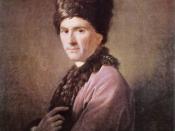"The French Revolution Owed Much to the Philosophes"
The French Revolution of 1789 had many causes, both short and long term. Thanks to inapt ruling for the better part of the century, France was in disarray financially, and thus, as so much depends on the economy, in most other ways as well. However, a Revolution such as the one in France does not come about simply because people are discontent. There also needs to be the concept of a better way of life, and some goal for the revolutionaries to strive for. This was provided by the philosophes, as the main French thinkers of the Enlightenment period were called. The ideas that they introduced into a society hungry for change were probably the most important, albeit indirect, cause of the Revolution.
The climate for the Revolution had been present for quite some time before it actually broke out. The root of the problem was the absolute monarchy as way of government, and the unreasonable power of the Church.
The French population was divided by feudal custom into three orders or "estates". In the First Estate, numbering about 100,000, were the clergy. The Second Estate consisted of the nobility, and numbered about 400,000. The rest, a great majority, were in the Third Estate, and included the bourgeoisie, the wage-workers and the peasantry. Still, only the King had the power to make any sorts of decisions about the running of the country. Government structures of this kind were present in many European countries at the time, and had been for centuries, with people being used to that way of life.
Over the course of the eighteenth century, France particularly suffered due to a string of weak monarchs that simply were not able to sustain stability in all aspects of the country and,


![Image taken from page 403 of '[The History of the French Revolution. Translated by F. Shoberl.]'](https://s.writework.com/uploads/1/11185/image-taken-page-403-history-french-revolution-translated-f-thumb.jpg)
Very nice!!
Very nice and descriptive essay. The bibliography adds up to the beauty of the essay. A very well done. Would help a person who does not know much about the revolution a lot.
2 out of 2 people found this comment useful.